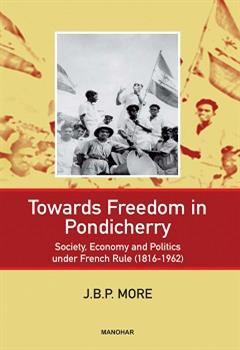Towards Freedom in Pondicherry: Society, Economy and Politics under French Rule (1816-1962)
no information available
Pondicherry had its own history due to its connection with the French. After delving deeply into social cultural economic aspects of the Pondicherry society the study focuses on politics and the freedom movement as it developed there using sources written in Tamil English and French. But when the freedom movement gathered steam in British India Pondicherry and its dependencies were caught between the ideas of joining the French Union or the Indian Union. Goubert’s Socialist Party’s strategy had always been to safeguard French India's special identity and interests. He and his party associates and supporters turned against the French offer to hold a referendum on the question of independence and decided to join the Indian Union because Jawaharlal Nehru provided him a better guarantee to safeguard French Indian and Pondicherry interests. It was rather a very well planned move that took all his political adversaries including the French by surprise. Goubert actually won his battle without bloodshed by accepting to bear a certain dishonor for that among the French. The French government finally chose to set aside the constitutional provisions of Article 27 of the French Constitution which stipulated that no cession or exchange or addition to the territories was valid without the consent of the concerned population. Thus they disregarded the population of French India deliberately and scuttled out of French India. Earlier they had given away the loges to India even without consulting the parliament or the people concerned but now they threw overboard the French constitutional provision to disengage themselves from India permanently after obtaining some weak guarantees for their cultural presence. About the Author Jean-Baptiste Prashant More (b.1955) is a reputed independent historian. He obtained his doctorate in history from the prestigious Ecole des Hautes Etudes en Sciences Sociales in Paris. He specialises in history sociology and politics of southern India and colonial India. His latest books include Pondicherry Tamil Nadu and South India under French Rule: From François Martin to Dupleix 1674-1754 (Manohar 2020) and Bose and his Movement: From Nazi Germany to French Indochina (Manohar 2022).
... Read more Read less










